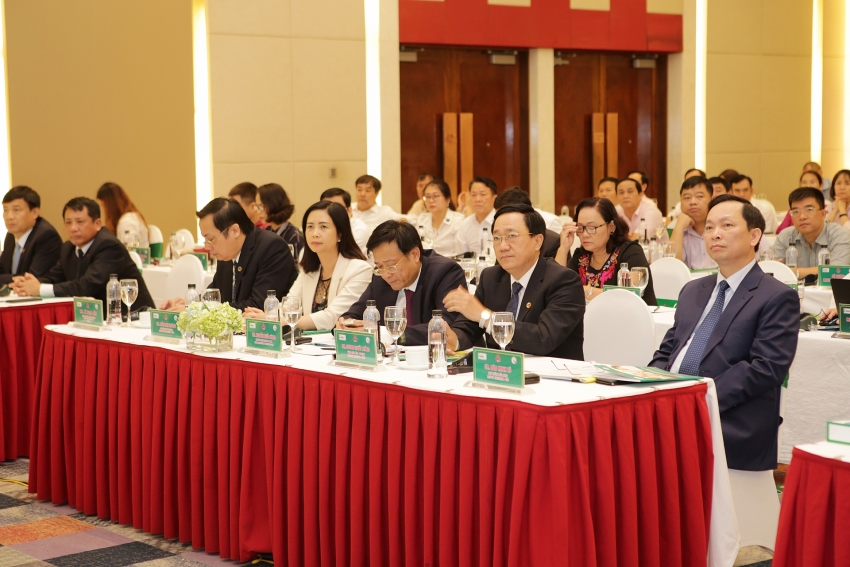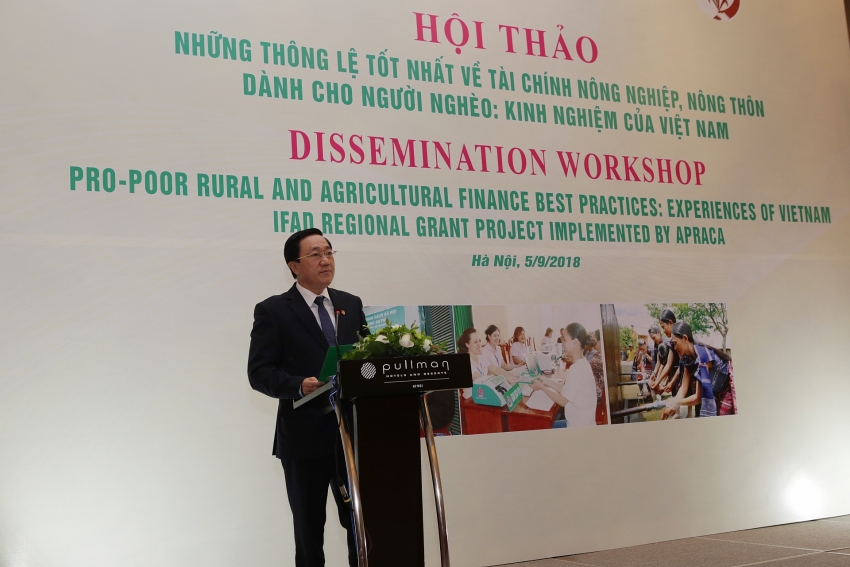Changing the poor’s perceptions on finance
At the workshop entitled “Pro-poor rural and agriculture finance best practices: Experience of Vietnam” hosted by Vietnam Bank for Social Policies (VBSP) in conjunction with the Asia-Pacific Rural and Agriculture Credit Association (APRACA), and the International Fund for Agricultural Development (IFAD) at the beginning of September, the State Bank of Vietnam (SBV)’s deputy governor Dao Minh Tu noted that after over 30 years of doi moi, finance for agriculture and rural areas in Vietnam has always received special attention from the Party, the government, and the banking sector.
Preferential credit programmes for agriculture and rural areas have been directed by the government and the SBV to be widely implemented throughout the banking sector on a national scale.
 |
| VBSP's credit policies have aided 31.8 million poor households in rural and agricultural areas |
Notable results of such programmes now include improved preferential credit mechanisms and renewed policies that work for borrowers and seek to expand credit limits as well as better procedures.
These, according to Tu, are aimed to meet the investment demands in agricultural and rural areas, create jobs, and gradually improve the living conditions of the rural communities, helping create a strong and comprehensive transformation in the rural, remote, and ethnic minority areas.
 |
| Dao Minh Tu, deputy governor of the State Bank of Vietnam (SBV) |
Credit institutions, meanwhile, have played their part in providing banking services for agricultural and rural areas, continuously expanding the scale of their network and diversity of their products and activities. These lenders, in particular, focus on implementing measures to mobilise financial resources to fulfil the needs of production and business development and poverty reduction in agricultural and rural areas, following the principle of separating commercial and preferential credit policies.
VBSP, in particular, was set up as a lending body for the poor and disadvantaged, operating under the method of entrusted activities through four socio-political organisations in combination with other supporting policies, such as industrial and agricultural encouragements, to help borrowers use the loan efficiently.
“Agricultural and rural credit for the poor has increased dramatically: it increases by 20 per cent a year on average, while policy credit grows by 13 per cent per year, promptly meeting the needs for comprehensive development of agricultural and rural areas, contributing to poverty reduction and enhancing the living standards of the communities,” said Tu.
Duong Quyet Thang, general director of VBSP, said that the lender currently has the largest network coverage in the banking system that ensures that the poor and policy holders in rural, mountainous, remote, and isolated areas can easily access financial and banking services at 63 provincial branches, 631 district transaction offices, and 10,962 transaction units opened at the Communal People’s Committee offices nationwide.
 |
| Duong Quyet Thang, general director of VBSP |
With 183,000 savings units and over 6.7 million customers, together with more than 20 preferential credit programmes for the poor, the total outstanding loans of VBSP have reached VND182.98 trillion ($8.09 billion), of which credit for agriculture and rural areas accounted for nearly 94 per cent. The disbursed funds have then been 100 per cent invested in communes, wards, and towns across the country.
VBSP credit has aided over 31.8 million poor households and beneficiaries to gain access to the funds they need, lifting 4.5 million households above the poverty line, while attracting and creating jobs for some 3.4 million labourers. Over 3.5 million students, in addition, have benefited from the funds to complete their study and over 9.7 million clean water and rural environmental sanitation projects have been launched thanks to the preferential credit programmes.
“Credit activities at VBSP have promptly and efficiently responded to the need for funds among the poor and other rural policy beneficiaries, contributing to poverty reduction, improving the living standards of farmers, and narrowing the income gap between regions, as well as preventing black credit in rural areas. An important result of the credit programme is that it has helped change financial perceptions among the poor on savings, self-raising funds, and accumulating for the future, which in turn contributed to the National Target Programme for sustainable poverty reduction,” Thang said.
What the stars mean:
★ Poor ★ ★ Promising ★★★ Good ★★★★ Very good ★★★★★ Exceptional
 Tag:
Tag:
Related Contents
Latest News
More News
- NAB Innovation Centre underscores Vietnam’s appeal for tech investment (January 30, 2026 | 11:16)
- Vietnam moves towards market-based fuel management with E10 rollout (January 30, 2026 | 11:10)
- Vietnam startup funding enters a period of capital reset (January 30, 2026 | 11:06)
- Vietnam strengthens public debt management with World Bank and IMF (January 30, 2026 | 11:00)
- PM inspects APEC 2027 project progress in An Giang province (January 29, 2026 | 09:00)
- Vietnam among the world’s top 15 trading nations (January 28, 2026 | 17:12)
- Vietnam accelerates preparations for arbitration centre linked to new financial hub (January 28, 2026 | 17:09)
- Vietnam's IPO market on recovery trajectory (January 28, 2026 | 17:04)
- Digital economy takes centre stage in Vietnam’s new growth model (January 28, 2026 | 11:43)
- EU Council president to visit Vietnam amid partnership upgrade (January 28, 2026 | 11:00)

























 Mobile Version
Mobile Version